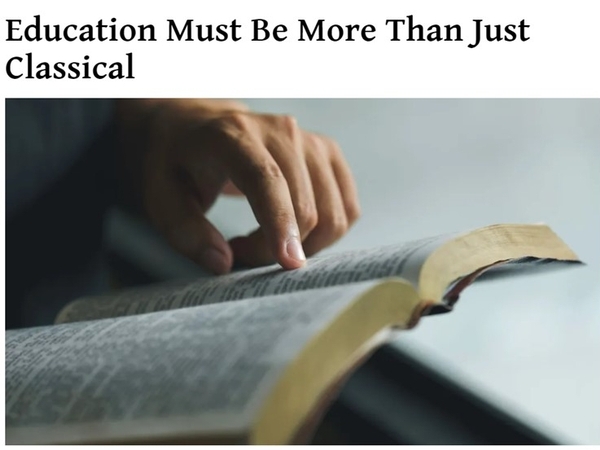Rockbridge Academy Blog
Education Must Be More Than Just Classical

"Virtues are hard things,” quipped National Review writer Daniel Buck in a recent opinion article entitled “The Virtues of Classical Schools.” Buck continued: “Fail a test of courage or act unwisely and virtue will demand justice or forgiveness. Values are subjective, virtues objective. The former is a preference, the latter a firm statement of right and wrong, true and false, good and evil.”
Examining one Hillsdale-launched classical charter school, Lake County Classical Academy (LCCA), Buck argues that although classical schools bear some similarities to their public counterparts, classical educators stand apart from our culture in that they are not afraid to incorporate structure and objective values into their pedagogy, policies, and classroom life.
As a graduate of a K–12 classical Christian school and a current teacher at another classical Christian school, I appreciated much in Buck’s article. Indeed, while much of public education rests on slippery, subjective foundations, classical education can rest on objectivity and uphold structure and hierarchy in the classroom in a way that benefits students and prepares them to comprehend truth and virtue.
Yet, as I finished Buck’s article, I couldn’t help feeling that he failed to explain significant attributes of the school he profiled and the classical-education movement in general. For instance: Who gets to define what virtue is, what “right and wrong, true and false, good and evil” are? What is the foundation from which these schools draw the objective truths they teach? For public charter schools such as LCCA, these questions cannot be fully answered, since such questions require a religious framework. One cannot define goodness and truth apart from an ultimate source of goodness and truth.
One cannot define goodness and truth apart from an ultimate source of goodness and truth.
Classical charter schools like LCCA have bloomed around the country, thanks to Hillsdale’s Barney Charter School Initiative and to the success of programs such as Great Hearts Academies and Valor Education. But the origins of today’s classical-school movement — origins that Buck did not mention — lie in a distinctly Christian understanding of classical education. As Emma Green documented in an extensive New Yorker article published earlier this year, today’s classical-education movement began with four Christian schools inspired by the vision of education held by Dorothy Sayers, a Catholic, and launched in the 1980s. In the 21st century, classical education has grown more pluralistic, thanks to the rise of classical charter schools and private classical schools without religious affiliation.
But classical education without Christ is not only oxymoronic, it is futile in an ultimate sense.
This portion of the article was republished with permission. Click HERE to continue reading Sarah Reardon's article in the National Review.
Sarah Reardon (class of 2020) is a graduate of Grove City College with degrees in English and classical studies. She wrote for GCC's newspaper, The Collegian, and the cultural magazine, Cogitare Magazine. She has contributed articles to Front Porch Republic, The American Conservative, National Review, and several online literary magazines.
